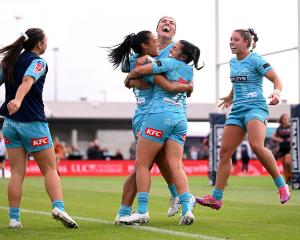Otago looked to be denied a try to flanker Adam Thomson in its match against Manawatu last Thursday, and Wellington first five-eighth Fa'atonu Fili also had what looked like a try ruled out in a Ranfurly Shield challenge against Auckland.
Referees now have to make on-the-spot decisions over tries and also seem to always consult assistant referees before making a decision.
The New Zealand Rugby Union in cost cutting measures announced last year said it was not using third match officials for the Air New Zealand Cup.
The union saved $220,000 by not having the officials with video technology to rule on tries.
The cost is high as fully qualified referees have to be used for the games, and they often have to be flown in from other centres.
Otago coach Steve Martin said he had no problem with referees making a decision, but video technology meant referees were becoming too cautious in awarding tries.
"What is happening now is the referee needs total confirmation the try has been scored and that sometimes allows players to dive in when the referee is not sighted to create confusion," Martin said.
He backed the referee to get it right most of the time, but with so much at stake in games, maybe it was time to consider technology available.
Third match officials will still be used in the Super 14.
Meanwhile, the cost of staging games at Carisbrook also meant the big screen at Carisbrook would not be used at every game.
Otago Rugby Football Union chief executive Richard Reid said with the expanded Air New Zealand Cup competition this year with a full round-robin, Carisbrook hosted two more games this season.
With each game costing about $25,000 to operate, he said that put an extra $50,000 expense in the budget which would not be covered by gate takings.
He said the large video screen was a significant cost, and would not be used in three of Otago's seven home games.
The video screen is rented and Reid said for commercial interests he could not declare the cost but the Otago Daily Times believes it costs the union about $11,000 a game to operate.












